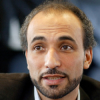Tariq Ramadan

Tariq Ramadan
Tariq Ramadanis a Swiss academic, philosopher and writer. He is the professor of Contemporary Islamic Studies in the Faculty of Oriental Studies at St Antony's College, Oxford and also teaches at the Oxford Faculty of Theology. He is a visiting professor at the Faculty of Islamic Studies, the Université Mundiapolisand several other universities around world. He is also a senior research fellow at Doshisha University. He is the director of the Research Centre of Islamic Legislation and Ethics, based in...
NationalitySwiss
ProfessionWriter
Date of Birth26 August 1962
CountrySwitzerland
It is important that the Muslim leaders, scholars, and intellectuals are much more vocal and explain what Islam is.
In Islam, rules are important, like the Prophet said innal halaala bayyinun, wa innal haraama bayyinun ["what is halal is clear, what is haram is clear"]. The goal is not to diminish the importance of rules, but to have the right priorities.
Very often we talk about India and China, but not really Malaysia and Indonesia. The potential in the shift to the East is going to be great and very important for this country.
I wanted to understand. I'm not here to support one, but I am here to criticize all, on a principled position. I very much value the position of counter power. I think this is where ethics should be, in front of power as I said in Radical Reform. The power of counter-power is very important.
The question about the Salafi is an important question as I say in Arab Awakening, and have often repeated since. I am really underlining the importance of this, because we really don't have very good memories. Remember - the Taliban in Afghanistan were not at all politicised in the beginning. They were just on about education. And then they were pushed by the Saudi and the Americans to be against the Russian colonisation, and as a result they came to be politicised.
To Islamize doesn't make sense to me. But to center, but to have intellectual empathy and modesty - all these dimensions are important on how we look at truth.
It's clear there is nothing in my record supporting terrorism.
We all cherish freedom of speech, but with a reasonable approach and a reasonable use of it. If we come to this, it is a debate. If not, then it is a power struggle. Who is going to win, the Muslim principles or the Western principles?
I've never suffered because of my heritage in Europe.
Many U.S. organizations believe that I am being barred from the country not because of my actions but because of my ideas. The conclusion seems inescapable.
We've got to get away from the idea that scholars in the Islamic world can do our thinking for us. We need to start thinking for ourselves.
The rich stick together; the poor and the marginalised are thrown together.
The world is a complex place, and the influence of the media in its representation and its power of communication and interpretation is a remarkable amplifier of emotions, and of illusions.
Cultures, along with the religions that shape and nurture them, are value systems, sets of traditions and habits clustered around one or several languages, producing meaning: for the self, for the here and now, for the community, for life.